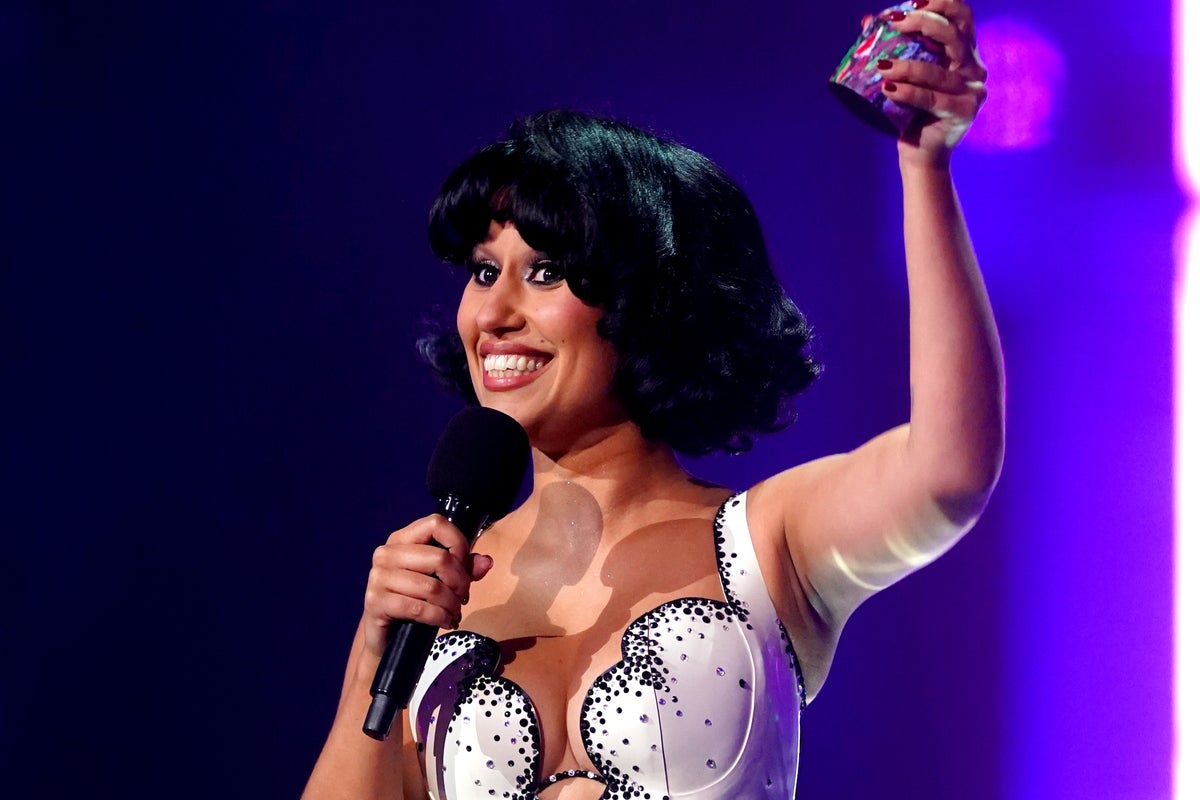Latest News
Raye’s indisputable triumph at the Brits may be the start of a total sea change in popular music
Published
2 years agoon
By
admin
Sign up to Roisin O’Connor’s free weekly newsletter Now Hear This for the inside track on all things musicGet our Now Hear This email for free
“What is actually happening right now?” said Raye, collecting her third gong of the night while coming to the realisation that the 44th Brit Awards were essentially morphing into a tribute evening to her. Even for those of us who hadn’t battled through years of music industry underappreciation and suppression – as this irrepressible London singer, songwriter and producer has done – the Brits 2024 were a somewhat out-of-body experience.
It wasn’t because Dua Lipa’s dancers floated into a human dodecahedron during her opening routine, fooling two million viewers at home into believing for a split second that the show’s producers had actually invested enough money into the production to invent bullet time from The Matrix. Nor was it the surreal image of Kylie Minogue necking a shot from her shoe with the son of one of Spandau Ballet. It was the moment that Raye – the Tooting musician born Rachel Keen – twirled onstage barefoot to collect her first award, instantly personifying a refreshing new era of mainstream pop after so many years of stagnation.
Of course, the Brits has always smacked more of a corporate sales conference than a celebration of the best British music. (If the Academy Awards judged their winners by the same metrics – commercial performance generally trumping quality – there’d be a lot more Oscar nods for Vin Diesel and Super Mario this year.) But around a decade ago, streaming algorithms became the primary dictator of popular tastes, pushing millions of passive listeners towards the already-established stars of the day and burying everything else. Ever since, the Brits have reflected the stultifying stasis that mainstream UK music was plunged into at that pivotal point when the fame/obscurity divide became untraversable for most – particularly those that didn’t already sound like what was already being paraded around that far-off golden circle.
Hence, in the past ten years, a revolving roll-call of around a dozen acts have snaffled up the majority of Brit prizes. Adele, Ed Sheeran, One Direction and offshoots, Dua Lipa, Little Mix and Coldplay were the high courtiers. The 1975, George Ezra, Stormzy and Sam Smith were occasionally blessed with favour, while a Rag N Bone Man might be permanently usurped every five years or so by a Lewis Capaldi or a Dave.
Since around 2014, then, any international audience tuning in to the ceremony hoping to catch a glimpse of cutting-edge music would have found it the award show Willy Wonka Experience, with Sheeran its despondent Oompa Loompa. Glimmers of KLF-versus-Extreme Noise Terror revolution, there were none. Nobody bothered invading the stage to waggle their backside at anything anymore. Liz Truss didn’t even need to take a spare pair of publicly-funded power trousers along last year, in case of a champagne bucket drenching.
Now perhaps someone put Kwasi Kwarteng in charge of aligning all the priority artists’ release cycles this year. Or maybe the voting academy finally realised that dishing out one award per billion streams meant that their TV audience of millions was dutifully tuning in once a year only to see how far British music had circled the creative plug hole – but the 2024 ceremony was hearteningly short on the usual suspects and broad on re-evaluation.
An ideology appears to have shifted for the better. After facing severe criticism over dropping its male and female categories in 2023 in the name of inclusion, then (duh) excluding any women or non-binary acts from the shortlist, sense prevailed: the number of nominees was doubled, and gender – if not genre – was pretty balanced. The presentation was also less try-hard. Rather than hire a major comedian to die horrifically in the toughest room for comedy this side of Young Fathers’ house, they picked the sort of unpretentious light entertainment faces – Clara Amfo, Maya Jama and Roman Kemp – to present the ceremony, capable of playing up to the corniness of the between-award skits, right down to doing stage snogs and shoe shots with Kylie Minogue, and staging a brilliant Traitors voting skit featuring the show’s own timeless legends Diane and Ross.
This traditionally politics-averse shindig seemed to have read the wider national mood. It selected Jo Hamilton, a real-life wronged sub-postmistress to present Song of the Year, and there even seemed to be a touch of political rebellion in the new design of the awards themselves, which appeared to be sculpted out of a stale, rotting heap of coagulated Eton mess. And crucially, the coronation of Raye – winning a record six of the seven awards she was nominated for – built on the fem-dominated Grammys, suggesting that the UK industry won’t just celebrate women but listen to them too.
Raye on stage with her grandmother accepting the night’s top gong ‘Album of the Year’
(AFP via Getty Images)
In 2021 Raye vocally fought back against the misogynistic major label system, which was preventing her from releasing her debut album My 21st Century Blues. Here, that confrontational, ground-breaking and brutally personal record – confronting sexual abuse, addiction, body dysmorphia and self-destructive hedonism – was rewarded by an industry perhaps out to confront and make right its past attitudes and behaviours. “I’m in control, I’m my own boss now!” she yelled during one of her many tearful acceptance speeches, and she proved it wholeheartedly during a barnstormer of a live medley that resembled every show-stealing Brit Award set ever performed, mashed into one. A verse of the vulnerable “Ice Cream Man”, a ballad about the soul-hardening effect of sexual harassment in the studio, performed solo at a grand piano, was her “Someone Like You” moment. Then a curtain lifted on an austere choir and orchestra as she sashayed into a mash-up of her Casso and D-Block Europe collaboration “Prada” and Song of the Year winner “Escapism” – part grime-pop queen, part big band diva. Phenom? Assured.
Enjoy unlimited access to 70 million ad-free songs and podcasts with Amazon Music
Sign up now for a 30-day free trial
Sign up
Enjoy unlimited access to 70 million ad-free songs and podcasts with Amazon Music
Sign up now for a 30-day free trial
Sign up
A good thing too since, even in such a landmark year, mundanity was writ deep in The Brits’ DNA. The only hint of drama was watching Young Fathers become increasingly unimpressed with each award they were robbed of, and most of the night’s performances were a harsh lesson in how expensive the unspectacular can get. Jungle’s retro Sixties cabaret show vibe was lovely but underwhelming, largely because Metronomy have been doing the same thing, equally charmingly, for some years now.
Raye has made Brit awards history (James Manning/PA)
(PA Wire)
Until their dancers went fairly bonkers at the end, Calvin Harris and Ellie Goulding’s beige rave rendition of “Miracle” was like watching a frothy latte come alive, right down to Goulding’s whipped-cream top and voice as characterless as a vanilla sprinkle. It fell to Nigerian artist Rema to bring some vibrancy to proceedings with a production pitched midway between The Lion King and Joe Versus the Volcano. And then to Minogue who provided the euphoric party finish, surrounded for her quickfire hits medley by dancers presumably borrowed from some future Devo tour.
No one was stealing Raye’s night, though. “I’m ugly-crying on national television,” she bawled as she collected her final trophy of the evening, Album of the Year, alongside her grandmother. Her board-sweeping success is unlikely to mark a total sea change in popular music, but it might at least signify that the old gods can be toppled, generational lines can be drawn – and music can have the appearance of moving on.


Russians describe senior officers ordering brutal execution of fellow soldiers

The Latest: Northeast snowstorm forces millions to stay home, disrupts flights and closes schools

Andrew Mountbatten-Windsor latest: Government backs files release as ex-duke accused of ‘self-enriching hustle’

Artsakh has no natural gas for 4th day, negotiations with Azerbaijan continue

Italy’s Palermo unanimously recognizes Artsakh independence

Captured in Artsakh terrorist says they were promised $ 100 for each severed head of ‘kafir’

NEWS.am latest, 03.11.20: Nagorno-Karabakh authorities have evidence of Azerbaijan using prohibited weapons in Artsakh

Captured in Artsakh terrorist says they were promised $ 100 for each severed head of ‘kafir’

